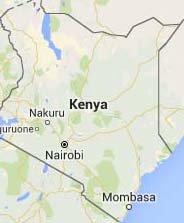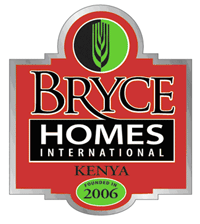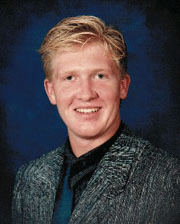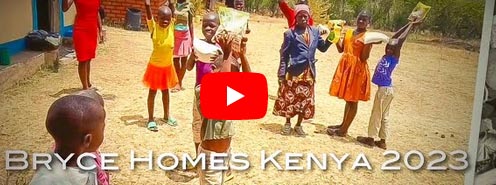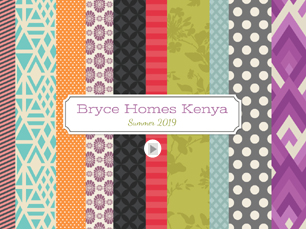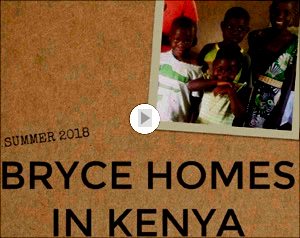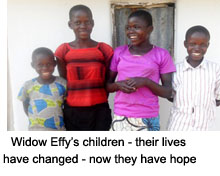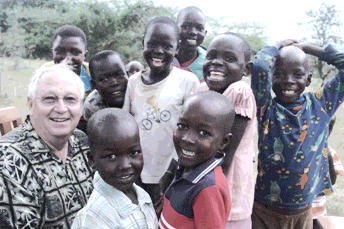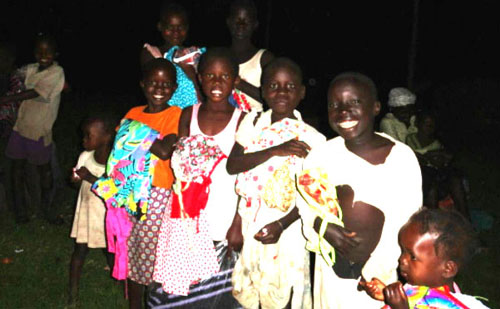|
March 2025
February 2025
November 2024
April 2024 from Kevin Fox
November 2023 from Kevin Fox
June 2023
October 2022
November 2020
October 2019
September 2019
August 2019
July 2019
June 2019
May 2019
Kenya Trip 2018 from Kevin Fox
March 2019
February 2019
January 2019
December 2018
November 2018
October 2018
September 2018
August 2018
July 2018
May and June 2018
April 2018
March 2018
January 2018
Year End 2017
December 2017
November 2017
October 2017
September 2017
August 2017
July 2017
June 2017
May 2017
October 2014
Bryce Homes in
Kenya – Water Filtration for All, Small Business Project Going Well, the Threat
of Disease, and More
We are happy to
report that all of the twenty-four Bryce
Homes in Kenya now have water filtration
systems. Understand the Times began to
place water filtration units in each
Bryce Home in June after Roger Oakland,
founder and director of Understand the
Times, returned from visiting the homes
this past spring. Many of the children
and widows were suffering with disease
and sickness because of unclean and
contaminated water. In a June report,
Roger explained:
It became apparent that one of the
greatest needs for our widows and their
families was water—both uncontaminated
drinking water and water for other basic
needs (bathing, washing clothing, etc.).
Where our families live in a remote
area, they are required to walk long
distances to get water from streams,
ponds, or community boreholes and then
carry the water in five-gallon pails
back to their houses. Not only is there
the problem of the water source being a
long distance away, such water also
contains many pathogens that are the
cause of serious life-threatening
diseases.
Understand the Times was able to obtain water
filtration systems from a company called Sawyer that provides such filters to
many organizations that help the poor around the world. The Sawyer filters are
inexpensive yet durable and easy to use. Thanks to Understand the Times and
Lighthouse Trails readers, we have been able to purchase enough systems so that
each of the Bryce Homes in Kenya have one. In addition to the water filtration
systems, the families will all be receiving a water collection system as we have
mentioned in the past. Some of the families already have them, and we hope all
the families will have them soon. This allows for the collection of rain water
that can be used for drinking, bathing, cooking, and personal hygiene
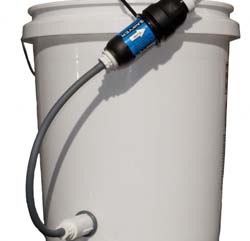
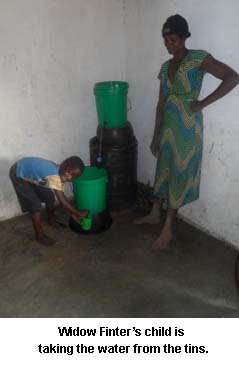
Small Business Opportunity (SBO)
We are also pleased to report that all of the Bryce Home widows now are
participating in the Small Business Opportunity (SBO) program started by UTT.
The small home-based businesses are up and running. As we have explained in
other reports, UTT gives each widow $75 as a start up amount. She, in turn, buys
raw materials or finished goods that she sells. Florence 2, the overseer of the
project (and one of the Bryce widows), checks in regularly with each widow to
talk about the progress and to remind the widows to save enough of their
earnings to turn around and buy more material or product. The testimonies coming
in from the widows have been wonderful. Each of them is testifying how this and
the other Bryce Home projects have changed their entire family life. And best of
all, when we hear these testimonies, they give the glory and thanks to God.
Solar Panel For Pastor Achilla
We are grateful for some special donations that came in that helped to pay for a
new solar panel system for Pastor Achilla’s house. The decision was made to
purchase the system after he had gone without electricity for several weeks,
making extreme hardship not just for his family but also for the Bryce Home
project. Being as Pastor Achilla is the head director of the program, it is
essential that he be able to use his computer and also have light in his home.
During any given week, many people come by Pastor Achilla’s house for some kind
of assistance or to have a meal. We have found Pastor Achilla to be a very kind
and giving man, and we are glad we were able to help set him up with solar
energy. As God provides, we would like to see all of the Bryce Homes have solar
panels in the future. Currently, most of them do not have any form of electrical
or solar power.
Vitamin C And Ebola
As you can imagine, many of the Bryce Home families suffer from poor health.
Most of the widows became widowed after their husbands died of AIDS. Needless to
say, some of the Bryce Home widows (and children too) have HIV. For privacy
sake, we don’t mention which ones do, but even if that wasn’t an issue, there is
the ongoing threat of disease and sickness to all of the families. After hearing
that Vitamin C could possibly help those with Ebola, we decided to try to make
sure that the Bryce Home families each had a small stock of Vitamin C if they
became sick with Ebola or other similar diseases. While we know that this is not
a sure cure, it is an affordable and easy-to-obtain substance that can help
improve the overall health and immune system.
PLEASE PRAY
Please join us in prayer as we ask the Lord for wisdom and guidance in moving
into the next stages of development for the Bryce Homes in Kenya. It was just
about 3 years ago that the project was launched after Roger Oakland made a trip
to Kenya where he saw the tremendous and dire need in the lives of these
Christian families in Kenya. Since then, twenty-four families have become Bryce
Homes in Kenya. New houses have been built, clothes and bedding purchased,
family agriculture developed, latrines have been built, cookstoves and stove
pipes installed in all the new homes, and much more. And best of all, the widows
and children are being taught the Word of God by Pastor Achilla, Pastor Nelson,
and other area pastors who have discernment; and many in the community are
turning to the Lord in seeing His goodness and mercy. What many of them are
saying now is, “God has not forgotten us.”
For those who may not realize it, this project is supported solely by UTT and LT
readers. If you would like to help support these dear families,
click here to go
to the Understand the Times donation page for the Bryce Homes in Kenya. There is a short piece,
below,
answering some questions about the program. Also
check out our newest slideshow (see below) for recent photos of the Bryce Homes
in Kenya. And thank you for your prayers and support.
Five Things You Might Be Wondering
1. Does the Bryce Home project have a U.S. building that it must maintain?
Answer: No, there are no U.S. overhead building costs whatsoever.
2. Does the Bryce Home project have a staff
it must pay?
Answer: The pastors in Kenya who run the program are compensated for their
time, but there is no paid staff in the U.S. or Canada.
3. How much of the donations from Lighthouse
Trails and Understand the Times go directly to the Christians in Kenya who are
in the Bryce Home project?
Answer: 100% of the donations received
4. How much accountability is there in the
Bryce Home project?
Answer: Roger Oakland, director of Understand the Times and founder of the
Bryce Homes International, travels to Kenya once or twice a year where he meets
with the three Kenyan men (Pastor Achilla, Pastor Nelson, and Walter) who are
running the program from Kenya. He also meets with each Bryce Home family during
these visits. In addition, both he and the editors at Lighthouse Trails have
regular communication through the year.
5. Is there an emphasis on teaching the Word
of God to the Bryce Home widows and children?
Answer: Definitely. While the program does put donations toward practical
needs such as housing, food, clothing, water purification, latrines, standard
education for the children, and start up money for agriculture and other
businesses for the widows, there is regular instruction in the Word of God
presented by Pastor Achilla, Pastor Nelson, Pastor Lawrence, and Pastor Daniel.

June 2014
Kenya Water
Program
While visiting our Bryce Homes in Kenya
in March of 2014, it became apparent that one of the greatest needs for
our widows and their families was water—both uncontaminated drinking
water and water for other basic needs (bathing, washing clothing, etc.).
Where our families live in a remote area, they are required to walk long
distances to get water from streams, ponds, or community boreholes and
then carry the water in five-gallon pails back to their houses. Not only
is there the problem of the water source being a long distance away,
such water also contains many pathogens that are the cause of serious
life-threatening diseases.
It was also obvious to me that there was
a very doable solution to this problem. When I returned from Kenya, we
reported on the need to collect water from the roofs of the newly
constructed houses that our donors have helped to build. Since then, in
these past three months, we have been able to construct three
water-collecting systems that cost approximately $500 each. Eve troughs
collect water runoff when it rains that is then drained into large clean
plastic tanks that store the water. The tanks are situated at the corner
of each house, and the water can be obtained by opening a valve whenever
needed.
Below are the photographs of the three
widows and the water-collecting systems that have been constructed so
far.
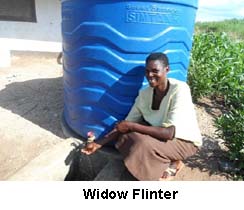
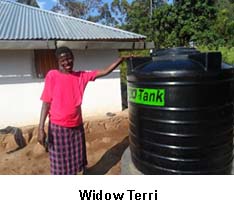
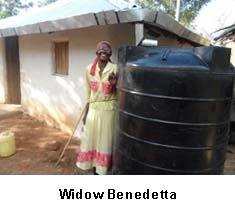
Widows Finter, Terri, and Benedetta are
overjoyed and very appreciative for the way the new water-collecting
systems have transformed their lives. The following is a short testimony
that Finter sent to us through Pastor Achilla, which expresses her
appreciation in her own words:
I am glad and glorify the Lord Jesus for
provision of this water tank. It has enabled my family to get clean rain
water for drinking. Because of this, the common infections brought on by
water-borne diseases, especially cholera and dysentery, have ceased.
Myself and the children have now been
relieved from the burden of transporting water from the river using
buckets carried on the head. Simply, it has given us peace.
The people in the village have also
surprised us as many come to request even a glass of rain water to
quench their thirst and even to take with them to their homes. I have
always given the testimony of God's favor whenever people come for
water.
This provision of the Lord has reminded
me of the LIFE GIVING WATER which our Lord Jesus gave to the Samaritan
woman (John 4:14). May the Lord be glorified. Amen. Thank you to all the
people who have stood with me. May God do to you the same as you did to
me. By doing God will’s, may He reward you all.
God bless you all,
Finter
In the future, as funds become
available, we have plans to construct more of these water-collection
systems in the remaining Bryce homes that we have built with metal
roofs. In the meantime, we are working on a plan to supply Sawyer water-
treatment/filtration systems so that all of our 24 homes will have a way
to purify water for drinking.
During the month of June, Pastor Achilla
and an associate will be picking up 10 of these units from a supplier in
Nairobi. At the same time, they will receive instructions on how to
maintain the units so that clean and uninfected drinking water will be
available for these 10 homes. The remaining 14 homes will also receive
these same units as soon as possible.
Evangelism
Finter’s testimony perfectly fulfills
the vision Understand The Times and Lighthouse Trails have for our Kenya
Bryce Homes Program. While we feel compelled to let our readers know
about the physical needs our families face and come alongside and assist
them, this is only part of our goal. More important is the fact that
these families are now sharing the light of the gospel to those who live
nearby, and the love of God is spreading to others.
In a future report, I will be sharing an
update about our Small Business Opportunity Program for widows. For as
little as $70 per widow, we are able to provide seed funds to the widows
who will be able to start a small business which provides an avenue
towards self-sufficiency.
We thank all those who have partnered
with us in the Bryce Homes Kenya Program. When we first met the widows
and children who were to become the Bryce Home families, most of these
widows were living in mud shacks with grass roofs (that leaked badly
during rainy seasons) or old deteriorated plaster houses that also
leaked. The floors were dirt, and both the children and mothers did not
have adequate beds and blankets and often had only one meal a day.
Cooking was done in an open fire on the dirt floor (which caused a
terrible fire-threat and respiratory problems because of the smoke). The
children’s clothing were little more than rags, and most of them
couldn’t attend school because they had no government-required
uniforms.
Today, the lives of these Christian
widows and children have completely changed. This is an incredible
testimony of the Lord’s goodness and mercy. And your support has made
the success of this program possible.

Please scroll down to read all of the reports.
March 2014
Report 11 Final Report
From the Kibera Slums to a Homa Bay
Paradise
Another chapter of
our Bryce Homes Kenya story relates to an amazing transition that has
occurred for Pastor Vitalis and his family who have spent years in the
Kibera slums of Nairobi living in deplorable conditions and
circumstances. I met Pastor Vitalis for the first time when I arrived at
the Nairobi International airport on my first trip to Kenya in November
of 2011. As I had a layover of several hours before connecting with a
flight to Kisimu, Pastor Achilla had arranged for Pastor Vitalis to meet
and help me make my connection from one terminal to another.
Pastor Vitalis was
my first contact with anyone from Kenya. He told me about his experience
living with his wife and large family in a mud shack in the slums of
Kibera. At the time, we were in the process of considering expanding our
Bryce Homes Program to Kenya. He showed me a photo of where he lived and
the number of children he was caring for, most of them orphans whose
parents had been killed by the tribal massacres that had devastated
Kenya as the result of a recent political election.
We had a meal
together which brought up the topic of food. When I asked him how he was
able to cope with such a large family living in the poverty conditions
he had described, he opened up and gave me more details. “At best, there
is only enough food to have one meal a day”, he said. Then he made a
statement that I will never forget: “We usually eat some rice or beans
just before we lie down at night so that hunger pains do not keep us
awake.”
The following year
on my second trip to Kenya when I was accompanied by my friend Byron
Hardy from Canada, our connection from Nairobi to Kisimu was not
scheduled until the following afternoon. This gave us time to get some
rest as well as an opportunity to meet with Pastor Vitalis and his
family in the Kibera slums. As his family had become part of our program
by then, I wanted to see for myself the conditions they were living in
and how we could help them.
Pastor Vitalis met
us at our hotel, and after we hired a driver, we headed off to the
Kibera area, which was about thirty minutes away from where we were
staying. Finally we arrived and found a place to park. Both Byron and I
were somewhat hesitant about stepping out of the vehicle. I have been to
many slum areas before in other parts of the world. What I was seeing
with my own eyes this time was as if I had landed on another planet.
We walked through the winding trails
over very rough terrain. It was difficult to navigate the open streams
of sewage that flowed everywhere. Garbage was strewn everywhere although
in a few places it was concentrated in open piles. As Byron and I were
the only white people in the area, we felt somewhat conspicuous. Finally
we arrive at the Vitalis home. The door was a sheet that provided
privacy from the outside world. Inside there was another sheet dividing
the mud hut into two rooms. Byron and I were offered the two chairs that
were in the one room. We were asked to sit down and were offered a
sliced bread. The children crowded around, and the entire family was
introduced.
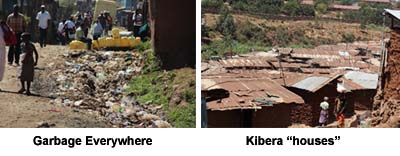
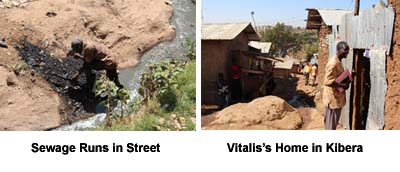
As Pastor Vitalis
had been part of our program for over a year, I was able to ask him some
questions regarding what differences his family had experienced. As I
looked around from the location where we were doing the interview, a
myriad of thoughts flooded my mind. While we were attempting to come
alongside and make a small difference, the impact on the lives of this
family was of paramount importance. Then I thought about the area where
we live in Canada and the United States and the luxuries of life
everyone takes for granted. Then I thought out loud: if only I could
transport some of the people who live in abundance to this location so
they could see, hear, and smell the sights of the slums of Kibera.
Wouldn’t they be willing to invest just a cup of coffee per day to
assist a Christian family in need who lives in these conditions?
God Answers Prayer
Moving Pastor Vitalis and his large
family of 16, which includes 10 orphans that he and his wife provide
care, has been on our list of things to accomplish in Kenya for some
time. When Lighthouse Trails and Understand The Times decided to do a
special fundraising program in
December of 2013
focused on adding latrines and new homes, moving Pastor Vitalis and his
family out of Nairobi became a priority. As Pastor Vitalis was born in
the Homa Bay area and grew up there, he was known to the chief in that
region. When he inquired about the possibility of moving back, it was a
matter of him making a trip to see the chief and securing a deed for a
plot of land.
Once the land was
secured, plans could proceed with the building of a home when funds
became available. When our donors heard about this need, they responded,
and we were able to go ahead with construction. Pastor Achilla traveled
to the site and hired a builder to clear the property of bush
and start the project.
When I arrived in
Nairobi on my March 2014 trip, Pastor Achilla met me, and we spent the
night in a hotel. The following morning Pastor Vitalis and four of his
children met me at the hotel, and we discussed the upcoming move to Homa
Bay. They were enthusiastic about the move, which should occur around
the middle of April. All sixteen children will be registering in a new
school located near their new house.
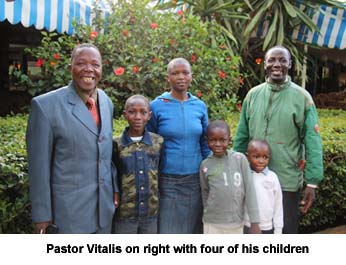
On my final full
day of touring the Bryce Homes, we were able to
start early in the morning and drive to the location where Pastor Vitalis’ new house is presently under construction. While we first
travelled towards Homa Bay then northward to the location by a paved
road, eventually we branched off to a dirt side trail. After what seemed
like an eternity, we approached the site where construction of the new
Vitalis home was taking place. As we got closer, I could see that the
area looked like a paradise compared to the Kibera slums where they are
presently residents.
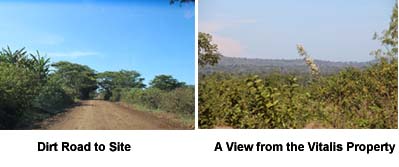
While Pastor
Vitalis’ house is partially constructed, it will only take a matter of
another couple of weeks to complete the process. Wooden poles are dug
into the soil and provide the structure for the walls. Smaller branches
are attached to both sides of the vertical poles.
Metal sheets supported by wooden rafters
form the roof. Then water is mixed with dirt to make mud that forms the
walls and floor. Finally when the mud dries, plaster is made from mixing
cement, sand, and water, and the walls and floors are coated. Windows
and a single door are added, then the house is complete.

When the house is
finished, it will be painted inside and outside so that it will be
white. As well, a latrine/shower will be built on the property, a cook
stove and chimney will be installed, and eventually eves troughs will be
added to capture water off the roof for storage in a large plastic tank.
The area
surrounding the home where Pastor Vitalis and his family will live is
extremely fertile. Fruit and vegetables can be grown, and livestock can
provide meat, milk, and eggs. In the near future, the family will be
able to participate in a small business program and work towards
self-sufficiency. Pastor Vitalis can start a Christian fellowship in the
area and spread the gospel.

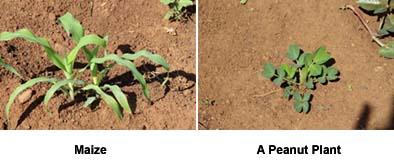
What a Miracle!
This transition
from hell to paradise, from the Nairobi Kibera slums to a fertile area
near Homa Bay, from my perspective is a modern-day miracle. While some
may insist that miracles require demon deliverance, being raised from
the dead, or cured of a terminal disease, the Vitalis family story shows
me God can be involved in changing impossible situations to bring hope
and a real difference in people’s lives. While this story is just one
example, it reveals how God is working in Kenya through the Bryce Homes
Kenya Program. This is God at work in a supernatural way using ordinary
people and ordinary circumstances.
Now think of this!
There are also 23 other Bryce Homes in Kenya that have their stories to
tell. On this trip, I made the decision to increase the number of Bryce
Homes from 20 to 24. This means there are now over 150 lives being
impacted that can share testimonies about the goodness of Jesus and the
difference the Bryce Homes Program has made to their lives.
Is it possible this
is only the beginning and that God has a plan for us to share this
vision on an even broader scale? As support is provided from individuals
and churches who seriously care about missions, we are committed to
follow the Lord, wherever and however He leads.
Kenya Report 10
The Miracle
The Bryce Homes in Kenya are not all located
in one concentrated area. At present, there are twenty of them scattered
in the area. As you can understand
administering a program to widows and families in such an expansive
region is characterized by many difficulties. However, this is how our
Bryce Home Kenya administration team has set up the program. This
expansive outreach spreads out the support and gives opportunity to
share the gospel over a wide area. This is the vision of the Bryce Homes
Kenya program incorporated from the beginning.
The families situated in the area
are all located within a few miles of each other. The widows and the
children in this area are regular attendees of Pastor Achilla’s or
Pastor Nelson’s churches. Delivering food to them is not such a huge
task. In every case, a vehicle carrying supplies is able to drive close
to the homes to make the drop off. In a few cases, the driver has to
make a detour from a trail and head across an open field or pasture
dodging the odd tree or large rock. Delivery of monthly food supplies
can be accomplished in several hours.
Not so for two homes or the six homes clustered in the
area. To reach these eight homes all in one day is a challenge. There
are three major obstacles – the roads that are not fit for vehicles, the
cows and goats who share these trails, and the weather. While the first
20 miles of the trip can be made on a modern paved road, this
is the only portion of the trip that is reasonable. The
road branches off and becomes a winding trail where drivers do their
best to navigate rock piles, cows, and washouts that act as speed bumps
and hinder speed beyond a few miles per hour.

However, these goat trails, as I call them,
remain passable as long as it has not rained recently. There is still
another major hazard. My experience has shown me as the result of
several of these trips, if there are dark clouds forming in the sky, you
better be prepared for a flash flood as small lakes of water and rivers
form in seconds making your way impassable.
As it is not possible to carry thousands of
pounds of supplies on the backs of a few men to their final
destinations, the drivers are determined to transform their vehicles
into “boats” and treacherously proceed crossing huge mud holes and small
rivers.
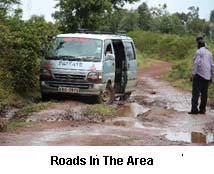
Finally, after encountering several of these
“near-stuck” experiences, the delivery mission finally reaches its
destination and the goods are dropped off. In some cases, it is just
impossible to reach the vicinity of the home by vehicle and Nelson,
Achilla, and Walter load the bags on their backs and carry them by hand.
On occasion, motor bike drivers come along and help carry the supplies
on the final leg. All in all, monthly deliveries are riddled with adversity and hardship and always take more time than
expected. If you start out at sunrise, you can expect it will be after
sunset by the time the days activities end.
Perhaps as you read through this report, you
are asking the question: If there are plenty of widows and orphans in
more accessible regions, why would you choose to
travel into the wilderness into areas that are nearly impossible to
reach? I have to admit, after my first experience of being shook up and
thrown around in the front seat of a van for over 12 hours, I was asking
the same question. However, now after seeing what God is doing in these
remote areas, I have a new outlook and have grown to appreciate these
widows who were chosen to be part of the Bryce Homes Program because God
is not a respecter of persons including whether or not they live in
accessible places.
In fact, it seems God is blessing the widows because they have suffered even
greater hardship because of the location in which they live. Pastor
Achilla, who himself was born and raised in the Kenya, has felt a
responsibility to assist widows and children who have been left
fatherless from the very beginning of the program.
I will never forget the first time I visited
Kenya. When we arrived, we were met by
a large group of children and about twenty widowed mothers who were
singing songs welcoming us.
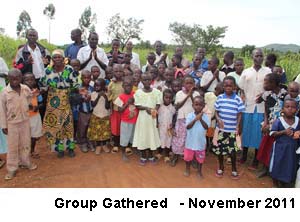
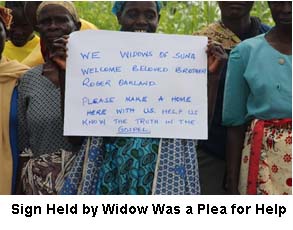
Most of the widows and orphans gathered
there that day had never seen a white person before. However, in their
desperation, they sensed that God had not forgotten them in their misery
and that possible help was on the way. While their hopes and dreams may
have seemed impossible at that time, we have now seen God’s hands at
work. Through Lighthouse Trails and Understand The Times, donors
worldwide have caught the vision and assisted us so we have been able to
supply food for eight families on a monthly basis as well as build six
new homes and six new outdoor showers and latrines in the region.
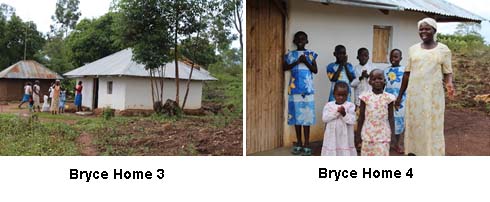
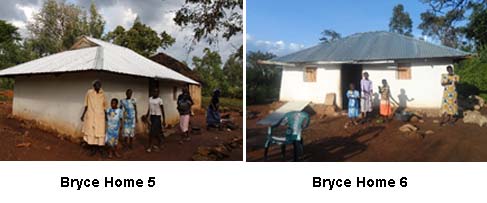
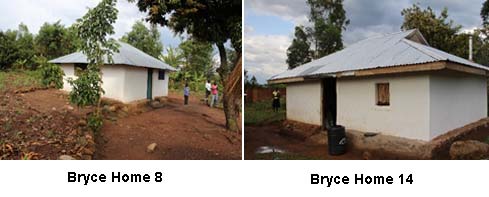
Testimony frShow Miracles
Have Unfolded
All six widows sponsored
shared testimonies that revealed how thankful they are to God for
answering their prayers. Isolated in a remote area when they were forced
into a situation to look after their children alone was an unbearable
situation. Because other families living in the community were as poor
and desperate as they were, there was no way to reach out and ask for
help.
Chief Jared, who oversees the community,
made a special trip to the area and followed us around as we visited each
home. As an appointed representative to the community by the Kenyan
government, he told us that what he has observed and reported is being
discussed by many other communities and true Christianity is being
observed in action.
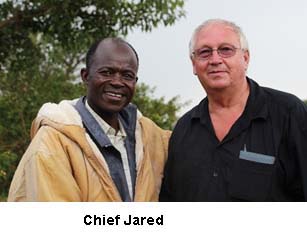
Future Projects
As previously reported, there are a number
of projects we are praying about for the Bryce Homes Program in Kenya.
These include capturing water from roofs in storage tanks, water
treatment in order to purify drinking water and implementing small
business opportunities so families can work towards self-sufficiency.
This will make a huge difference and will open up the
possibility that more widows and orphans can be added to the program.
As well, we have a plan to add a
pastor/evangelist devoted to teaching the Bible and being a spiritual
leader for all of the families in the area. In the near future, we have
plans to build a small church so that families can gather to worship. By
a church, I am not referring to an elaborate building with stain-glass
windows and a paved parking lot.
A wonderful miracle is underway in the area. May God continue to pour out His blessings as the months go by
as prayers continue to be answered and the gospel continues to be
spread. My heart has been touched by what I have seen and heard and am
committed to tell others so that they know about the good work God is
doing through the Bryce Homes Kenya Program.
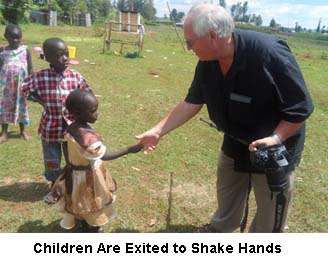
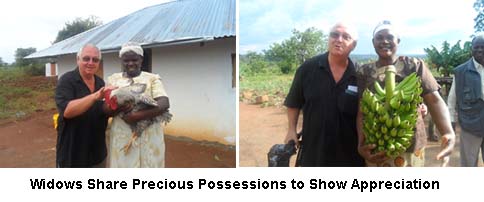
Report 9
Helping
Widows to Become Self-Sufficient
Life in Kenya is difficult enough. However,
when a mother who has several children loses her husband to the ravaging
disease known as AIDS (or some other all-too-common disease in Africa),
her life becomes a horror story. Imagine if you can what happens when
the man who fathered your children and provided food and shelter for
your family suddenly dies and you are left alone. How does a widowed
woman, who barely survived before the death of her husband,
continue to live and support her children when she is on her own? Can
you image the despair and hopelessness that overcomes her?
Families with widows as the only parent
brought about by AIDS makes up 60% of the population according to one
government official. Worse yet, in many
cases both parents have been wiped out by this disease and grandmothers
who are also single are called upon to raise their grandchildren. They
have no income, no food, and no way to make their quality of life
better.
While there are government agencies and
global fundraising organizations dedicated to looking for solutions to
the problem of AIDS, the fact is, there are a myriad of widows left
helpless in dire situations. Families go to bed every night hungry and
crying for food. The clothes they wear are nothing but torn rags. They
huddle under thatched leaky roofs when it rains and shiver on mud floors
without any mats of blankets so that sleep is impossible. Such is the
life of countless fatherless families who belong to the family of God
and the body of Jesus Christ in Kenya.
The widows in the Rarea that God has called us to reach out to and care for are all
Christians. When we met them, they were regular attendees of Pastor Achilla’s church or cared for by associate pastors who volunteered their
services to care for those more needier than themselves. Pastor Achilla
is well known in this region, not only as a man of God but a man who has
great compassion for the poor and needy. Whenever and wherever I have
traveled with him, people approach him and greet him. He is a true
pastor that makes people a priority and loves and cares for those in
need.
Before we partnered with Achilla and his
team, he was already doing all that he could to encourage widows.
Numbers were being added to his small congregation on a weekly basis.
The burden to minister to their needs seemed like an insurmountable and
overwhelming task.
It was this attitude and vision that caught
my attention in November of 2011. The Bible encourages members of the
family of God to reach out and care for widows and orphans and respond
accordingly. In the book of James, chapter one and verse 27, we read:
“Pure religion and undefiled before God and the Father is this, to visit
the fatherless and widows in their affliction….”
Such a concept is a foreign idea for most
churches and church leaders today. Their concept of spending the
resources they have been given by their supporters usually goes towards
buildings and empires that can be seen as marks of success. Missions
programs that invest in lives far away are not good “business”
decisions. “Real religion” in the modern world has turned God’s Word
upside down. It is more about “more for us” and less and less for
others. Widows and orphans are forgotten about and ignored.
This westernized mentality that drives the
purpose-driven, church-growth mindset has always troubled me. For years,
I thought and prayed about how this could be changed. Then there was a
breakthrough. As our ministry was in the process of moving towards our
Bryce Homes International Program that was born in 2006 in memory of my
son Bryce, it seemed that a partnership with Pastor Achilla and his team
in Kenya would be a perfect fit to fulfill God’s calling upon my life.
This partnership, which later expanded to include the promotion by and
support of Lighthouse Trails, has now proven itself for over three and
one half years.
The Road from Dependency to Self-Sufficiency
However, when God is truly in the lead, one
never stands still or in one place. God is almighty and sees what is
best and the steps that are required to move on. While the Bryce Homes
Program has been a great success, there has been a question or concern
that has been consistently at the forefront of my mind. While food has
been provided on a monthly basis along with clothes, homes, and latrines
to make life easier, there was something missing.
The purpose of designing the Bryce Homes
Program was never to become a welfare agency by becoming a never-ending
pipeline guaranteeing assistance perpetually so that entire families
could grow up depending on others instead of helping themselves. Such a
system, in the long run, would be harmful and destructive. I pondered.
There had to be a better way so that through time a transition could be
made from total dependency to self-sufficiency.
|











